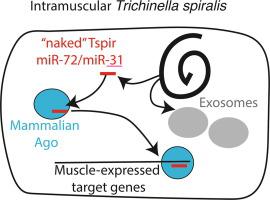International Journal for Parasitology ( IF 3.7 ) Pub Date : 2020-07-03 , DOI: 10.1016/j.ijpara.2020.05.008 Peter J Taylor 1 , Jana Hagen 2 , Farid N Faruqu 3 , Khuloud T Al-Jamal 3 , Bonnie Quigley 2 , Morgan Beeby 2 , Murray E Selkirk 2 , Peter Sarkies 4

|
Many organisms, including parasitic nematodes, secrete small RNAs into the extracellular environment, largely encapsulated within small vesicles. Parasite-secreted material often contains microRNAs (miRNAs), raising the possibility that they might regulate host genes in target cells. Here we characterise secreted RNAs from the parasitic nematode Trichinella spiralis at two different life stages. We show that adult T. spiralis, which inhabit intestinal mucosa, secrete miRNAs within vesicles. Unexpectedly, T. spiralis muscle stage larvae, which live intracellularly within skeletal muscle cells, secrete miRNAs that appear not to be encapsulated. Notably, secreted miRNAs include a homologue of mammalian miRNA-31, which has an important role in muscle development. Our work therefore suggests that RNAs may be secreted without encapsulation in vesicles, with implications for the biology of T. spiralis infection.
中文翻译:

旋毛虫分泌大量未包封的小RNA,对宿主基因表达具有潜在影响。
许多生物体,包括寄生线虫,都将小RNA分泌到细胞外环境中,并大体上包裹在小囊泡中。寄生虫分泌的物质通常包含microRNA(miRNA),这增加了它们可能调控靶细胞中宿主基因的可能性。在这里,我们表征了在两个不同生命阶段从寄生线虫旋毛虫中分泌的RNA 。我们显示,居住在肠粘膜中的成年T. spiralis会在小泡内分泌miRNA。出乎意料的是,螺旋藻在骨骼肌细胞内生活的肌肉阶段幼虫分泌的miRNA似乎没有被包裹。值得注意的是,分泌的miRNA包括哺乳动物miRNA-31的同源物,它在肌肉发育中具有重要作用。因此,我们的工作表明,RNA可能会在不封装在囊泡中的情况下被分泌出来,这对螺旋螺旋体感染的生物学意义产生了影响。











































 京公网安备 11010802027423号
京公网安备 11010802027423号